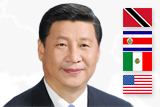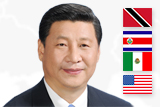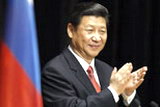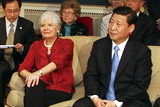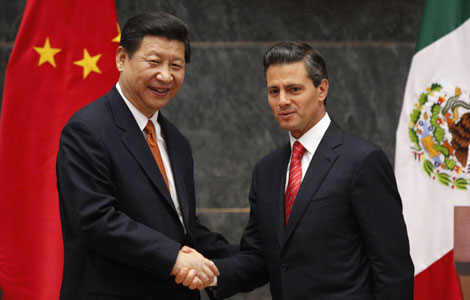A shared world dream
Updated: 2013-06-01 01:30
By David Gosset (China Daily)
|
|||||||||
The US and China can demonstrate their common desire for global peace and development in the 21st century at Sunnylands
The vital importance of bilateral relations between China and the United States is obvious.
While former Chinese presidents Jiang Zemin and Hu Jintao made their first trip to the US several years after they entered office, US leader Barack Obama will welcome his new Chinese counterpart Xi Jinping only three months after Xi became president of China.
The two statesmen find themselves at a historical juncture between either a rising rivalry fueled by populist sentiments or the quest for a new paradigm, which would accommodate the redistribution of world power and single out either fear and the perspective of conflict, or the boldness and effort to protect against the follies of war.
Two of the most powerful men on the planet will meet at Sunnylands, the Annenberg Foundation Trust estate in the Californian desert; they do not have to prepare for hard negotiations on specific issues, as the two-day retreat is being seen as an opportunity to build personal rapport between them and is conducive to in-depth exchange of ideas, those intangible but essential elements of world politics.
The Korean Peninsula, disputes in the East and South China seas, cyber security, Iran, Syria and the Middle East, Central Asia, the stubbornly persistent effects of the 2008 economic crisis, climate change, are all issues that will occupy their attention and discussions, but what really matters in the long term is addressing the perception gap which characterizes the relationship and defining a common grand vision for the future.
By reaffirming that the US welcomes the Chinese renaissance and is ready to deepen cooperation with Beijing without ideological bias, Obama can help establish a climate of trust by overcoming widespread suspicions that the US' rebalancing to the Asia-Pacific is synonymous with containing China.
Washington's aggressive pushing of the Trans-Pacific Partnership, which excludes China, has added to the misunderstanding created by the US' rebalancing to Asia. As the study US-China 2022: Economic Relations in the Next 10 Years by the China-United States Exchange Foundation points out, the potential for Sino-American business relations is enormous. Indications that a free trade agreement between the two largest economies in the world could become a reality would help put the relationship on a constructive course.
Likewise, by reaffirming that China's reemergence does not entail the West's decline, Xi can help build trust.
China's return to centrality certainly requires a new articulation between the two Pacific countries, it does not necessarily contradict the US' long term interests. The US can maintain good relations with Japan, South Korea, Vietnam or the Philippines, but at the end of the day it is with China that Washington needs to work.
Between an antagonistic bipolarity and an unrealistic political integration around the Pacific, China and the US can envision a middle way, a combination of competition and cooperation which could lead to what Henry Kissinger calls at the end of his book On China, a Pacific community.
Despite the apparent divide between China and the US on many issues, Xi and Obama are united by two fundamental realities.
First, Western modernity is fully compatible with the Chinese renaissance. Secularism and a belief in social and economic progress are at the core of Chinese and Western societies.
Second, while the US and China remain, to a certain extent, the last two real sovereign states in the midst of powerful globalizing forces, the magnitude of the 21st century security and development challenges exceeds their capacity to face them alone, neither a Pax Americana nor a Pax Sinica can guarantee that today's multipolar system does not degenerate tomorrow into global disorder.
At the Sunnylands retreat, the Chinese Dream and the American Dream can cross-fertilize, far from being exclusive they can be the catalysts for a World Dream, an inspirational vision of equilibrium between East and West, unity and diversity, progress and sustainability.
At the end of their Californian encounter Xi Jinping and Barack Obama do not have to reach any specific agreement but, aware of a shared sense of global responsibility, they can proclaim to the world: “We have a dream.”
The author is director of the Academia Sinica Europaea at China Europe International Business School (CEIBS), Shanghai, Beijing & Accra, and founder of the Euro-China Forum.
Related Stories
President Xi Jinping gives joint interview 2013-05-31 23:43
Xi's Americas tour shows balance, innovative style 2013-05-31 19:16
Xi's visit to Trinidad and Tobago marks peak in ties 2013-05-31 15:05
Xi, Obama to seek new tone at summit 2013-05-31 14:26
Xi's visit to boost China-Caribbean ties 2013-05-31 11:04
Xi leaves for Latin America, the Caribbean 2013-05-31 09:47
Schedule
